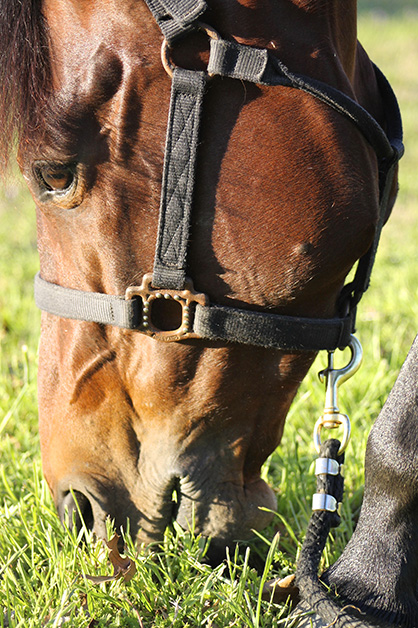Spring Grass: Panacea or Liability?
Spring grass is mother nature’s panacea for winter’s nutritional hardships and the huge demands of pregnancy and lactation. However, rangelands utilized by feral horses usually bear little resemblance to the fields of domesticated horses and even in the spring their diets also include high fiber items like shrubs. Unlimited access to powerhouse grasses can cause some problems.
Young grasses are low fiber, very high protein and higher in rapidly fermentable carbohydrate fractions than more mature growths. This can lead to a variety of hind gut digestive upsets including bloating, varying degrees of manure softening/diarrhea, and in some cases colic. This can be avoided by careful introduction to the new grass.
Given the option, every horse will gorge on the succulent young grasses and largely ignore anything else you try to get them to eat – including grains in many cases! When their large intestine is packed full of the rapidly fermenting grasses it produces conditions that do not favor proliferation of fiber fermenting organisms. To balance this out, keep the horses off the grass for 12 to 18 hours per day with access to good hay. When the pasture is particularly dense it may need to be longer than this. Gradually allow longer grazing periods, always keeping a close eye on manure.
Supplementing with live yeast cultures is beneficial.
Yeast have been documented to help avoid changes in the colonic environment that have a negative impact on fiber fermentation. It is also useful to feed a source of easily fermented soluble fiber to further support the fiber fermenting organisms. Psyllium and beet pulp are particularly good sources.
Minerals to balance new grass.
Spring grasses can also be low in Magnesium and sometimes other major minerals such as Calcium. Sodium levels are typically quite low. Combinations of these factors may interfere with digestion or intestinal motility and can even result in electrolyte disruptions such as thumps. Magnesium sensitive horses can also show increased nervousness and muscular twitching. EPSM horses often have noticeable increase in symptoms which could be from low Magnesium intake and/or high sugar and starch in the grass.
Speaking of sugar and starch levels, insulin resistant horses are at extremely high risk of developing laminitis. It may not be a full blown laminitis every year but there will always be damage to some degree. There is no way to prevent this, no supplement or management approach that makes spring pastures safe for IR horses.
If reaction to low Magnesium is suspected, supplement with 5 to 10 grams per day. All horses should also receive a minimum of 1 oz of table salt per day in their feed. If providing free choice salt, use a coarse granular rather than salt blocks, fed in a covered feeder. Daily formal exercise is particularly important for EPSM horses on lush spring pastures. If worsening symptom persist, pull them off pasture until it has matured.
There can definitely be too much of a good thing with high quality spring pastures. Controlled intake and a few intelligently selected supplements will help your horse get maximum benefit without the drawbacks.
Absorb All supports the intestinal tract to help maintain healthy gut flora, proper gut pH, and promote healthy digestion and bowel health.
Quadra Fac supplies active cultures to support digestive function, healthy enzyme activity, and proper nutrient absorption.
Magnesium Oxide supports balanced behavioral, muscular, endocrine and immune response.
Psyllium Husk is a great fiber source as a bulking and binding agent, particularly for horses eating from the ground or grazing short pastures.
About Dr. Kellon
Dr. Eleanor Kellon, staff veterinary specialist for Uckele Health & Nutrition, is an established authority in the field of equine nutrition for over 30 years, and a founding member and leader of the Equine Cushings and Insulin Resistance (ECIR) group, whose mission is to improve the welfare of horses with metabolic disorders via integration of research and real-life clinical experience. Prevention of laminitis is the ultimate goal. www.ecirhorse.org
Uckele Health & Nutrition is an innovation-driven health company committed to being on the leading edge of nutritional science and technology for over 50 years. Uckele takes pride in formulating and manufacturing a full spectrum of quality nutritional supplements incorporating the latest nutritional advances for equine athletes and companion animals to help achieve optimal health. www.uckele.com











